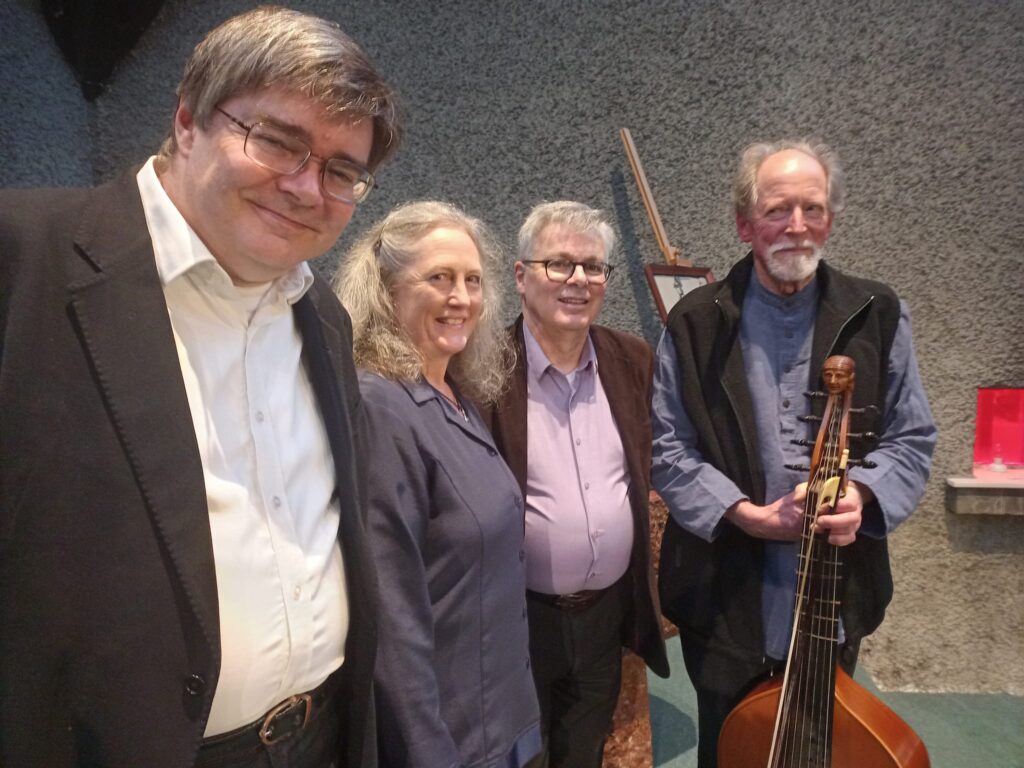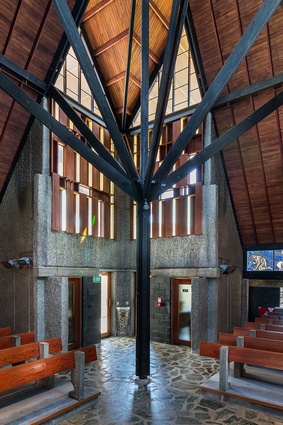Wellington Chamber Music presents:
Andrew Joyce (‘cello) and Jian Liu (piano).
J.S. Bach – Sonata in G Minor for Cello and Piano (BWV1029)
Ralph Vaughan Williams – Six Studies in English Folk Song
Dorothy Buchannan – Soliloquy for Two
Fang Dongqing – Lin Chong
Paul Hindemith – Phantasiestuck in B Major, Op. 8 No. 2
Johannes Brahms – Sonata No. 2 in F Major
Sergei Rachmaninoff. Sonata for Cello and Piano in G Minor. Op 19. III. Andante
St.Andrew’s-on-The-Terrace, Wellington
Sunday, 9th June, 2024
There’s something reassuring about watching professionals at work. I’m not sure if “reassurance” is the right word, exactly, but I certainly felt some sense of content awe on Sunday, knowing that I was listening to an excellent performance of beautiful music. I adore watching performers of all levels, but there is something special about sitting back and letting the consummate professionals take care of everything.
It was a typical windy Wellington day, so I was very appreciative of the heating in St Andrews. Unfortunately, I sat behind a rather tall audience member, so my view of the cellist, Andrew Joyce, was a tad obscured. Andrew gave a comprehensive introduction to the programme, explaining the poetic background to Buchannan’s piece, the angular sounds of Hindemith and the Romantic ending with Brahms.
From the moment Jian and Andrew begin playing, you know you’re in for a treat of musical excellence. Starting off with Bach’s Sonata in G Minor, the Vivace was energetic and vibrant. It was nice to see the difference in how the two musicians actually moved. Andrew moved his head rhythmically, with a typical cellist intensity, while Jian sort of bobbed along to the piano. I don’t know what it is about a musician’s movement that fascinates me, but I can’t help but notice it. It’s genuinely enjoyable for me when performers actually move with the music. The adagio was rich and moving, with lovely use of vibrato, and gorgeous, even playing on piano. The trills brought a particular tension to the piece which I really enjoyed. The allegro was light and playful, with a great dialogue of call and response. The building of parts and dynamics was rich, and there was never a moment of stillness. The final note of the piece was accompanied by murmurs of awe from the audience.
The Six Studies in English Folk Song followed Bach. I didn’t realise that these studies would be so short, although I probably should’ve inferred that from the title. The adagio, ‘Lovely on the Water’, was very different from the Bach, but absolutely lovely, with a gorgeous, whole sound from the cello. The andante sostenuto, ‘Spurn Point’, felt very romantic: not the movement, but the lovey-dovey feeling, with really nice higher notes. The larghetto, ‘Van Diemen’s Land’, had a deep, almost mournful quality. It felt like the homeward journey of knights after a battle. The lento, ‘She Borrowed Some of her Mother’s Gold’, was lovely, a sort of deep honey. The andante tranquillo, ‘The Lady and the Dragon’, was elegant, gentle and genteel. There was a great moment where the cello faded and the piano took over. I wrote down “a lovely brocade” in my notes. I’m not entirely sure what I meant by that, but it sounds nice. The allegro vivace, ‘As I walked over London Bridge’, was playful and intense, with great ending dynamics.
As a slight devotee to literature, I was very intrigued by Buchannan’s Soliloquy for Two, as it’s based on Robert Frost’s poem, ‘The Road not Taken’. The melody felt philosophical, with a sort of pondering quality to it, while the piano walked along the road, steady but light. There was a lovely clarity of sound in this piece, with both parts balanced evenly in the church’s acoustics.
At the start of the concert, Andrew said some parts of Dongqing’s piece were almost “unplayable.” I was unsure what he meant at first, as it started smooth and lyrical, with some surprising moments of intensity from the piano. However, then there were suddenly lower strings and harmonics, along with pizzicatos, and I understood his starting comments. The speed of the runs were amazing, with intense double stops and pizzicatos. There was really great duo work from Jian as he looked over at Andrew for the right timing of angry chords, adding a real dynamism to the performance. It was not at all where I expected the piece to go. After this intensity, the piece went back to a lovely, quieter melody, and then finished with an attack. It was the piece I wrote down the most for because of how much was happening. It was incredible, I could barely keep up in my notebook.
After the interval, there was Hindemith’s Phantasiestuck. It was beautifully Romantic, a tad unexpectedly so from Hindemith. As mentioned at the start, there were moments with some “angular” sounds, particularly with the unexpected intervals next to an otherwise soaring melody.
The Brahms Sonata was a superb. The allegro vivace had beautiful swells of dynamics. So much was going in this movement, with intense double stopping, then feather-light bowing, then a deep and full melody. The adagio affettuoso had a lovely start with the pizzicato and piano. There was a real sense of movement from Jian on the piano, along with the lovely vibrato from Andrew at the end. The “schero-like” (as noted by the programme) intensity and vibrance of the allegro passionata was brilliant. The allegro molto had a quiet and joyful intensity that built as it continued. The technical skill of these musicians was just amazing. To be honest, I was too swept up by Brahms to write more.
After a rapturous applause, we got treated with the third movement from Rachmaninoff’s Sonata for Cello and Piano in G Minor, as a little excerpt from their other programme. It’s a classic piano and cello piece, and was lovely to hear live and done so superbly, especially after being on my playlist of favourite Cello pieces for a few years.
I really cannot stress enough how brilliant this concert was. Every note was perfect, the energy was palpable, and the audience was swept away. If you ever get the chance to see Andrew Joyce and Jian Liu perform, I strongly urge you to take full advantage of it.
 David Morriss (bass), Pepe Becker (director, soprano), Douglas Mews (keyboards), Robert Oliver (bass viol)
David Morriss (bass), Pepe Becker (director, soprano), Douglas Mews (keyboards), Robert Oliver (bass viol) Futuna Chapel, Karori
Futuna Chapel, Karori